Online Research Talks Series on Philosophical and Psychological Approaches to Virtue & Value
Wednesday 2 May 2024
Wednesday 5th June 2024, 2.30pm – 4.00pm (London BST)
Dr Tenelle Porter (Rowan University)
Title: Investigating the Effect of Teachers’ Intellectual Humility on Students’ Interest and Learning
Abstract: The expression of intellectual humility – publicly admitting confusion, ignorance, and mistakes – can benefit individuals, but can it also benefit others? Five studies tested the hypothesis that teachers’ expressions of intellectual humility would boost U.S. students’ motivation and engagement in learning. In two pilot studies (one preregistered, combined N = 231), adults (50% women; 58% White, 25% Black) and adolescents (48% girls; 53% White, 33% Hispanic) anticipated being most comfortable expressing intellectual humility and interested in a hypothetical math class when a teacher’s class description modeled expression of intellectual humility relative to when the teacher recommended that students show intellectual humility or mentioned nothing about intellectual humility. Two fully powered, preregistered experiments with undergraduates (both 50% women; Study 3: 58% Asian, 17% Hispanic or Latinx, 16% White; Study 4: 53% White, 16% Asian, 16% Hispanic or Latinx; combined N = 767) replicated these effects and identified three mechanisms: an increase in sense of acceptance with the teacher, an increase in the sense of belonging with peers, and a decrease in the belief that failure hurts learning. Study 5 (preregistered) revealed that high school students (51% girls; 92% White; N = 411) were more motivated and engaged in their classes when they perceived their teachers to be more intellectually humble, with the largest benefits for young women. Longitudinally, teachers’ modeling intellectual humility predicted changes in students’ grades via willingness to express intellectual humility. Teachers’ intellectual humility may benefit students’ interest, engagement, and learning in school.
Thursday 20th June 2024, 2.30pm – 4.00pm (London BST)
Professor Rebecca Stangl (University of Virginia)
Title: Moral Exemplars, Advice, and Practical Wisdom
Abstract: Moral exemplars play an important and even central role in many virtue ethical theories of practical reason and right action. The virtuous person not only sets the standard for right action, she is also someone whose moral advice should be sought and relied upon. This strain in virtue ethics, however, is in tension with an important line of argument in the recent literature on moral testimony. Pessimists about moral testimony think there is something irrational, fishy, or at least suboptimal about deferring to moral testimony. According to some, this is because deferring to moral testimony reveals a lack in our current virtue, does not make us more virtuous by its reception, and may hinder us in the longer term from developing virtue in the future. So, who is right? The virtue ethicists who recommend, at least in certain cases, deferring to moral exemplars? Or the pessimists about moral testimony who claim such deference is incompatible with virtue? I will argue that, with some caveats, the virtue ethicists are right. Moral exemplars can play the role that virtue ethicists assign them without thereby undermining the development of virtue in those whom they advise.
Monday 11th November 2024, 2.30pm – 4.00pm (London GMT)
Professor Jen Cole Wright (College of Charleston)
Title: Understanding Dimensions of Disagreement – Can Humility Help Us Bridge the Divide?
Abstract:
Disagreement is natural and healthy, generated through our need to live both in collectives and as unique and creative individuals. When well-functioning, it contributes to our capacity to flourish. But it can also become intrenched and destructive, interfering with both individual and collective wellbeing. Together, we’ll explore some of the features of destructive and constructive disagreement and consider what role fostering humility has to play in transforming it from the former to the latter.
Monday 10th February 2025, 2.30pm – 4.00pm (London GMT)
Professor Blaine Fowers (University of Miami)
Title: Assessing Wisdom and the Place of Intellectual Humility
Abstract:
This talk will examine two ways to understand the connection between wisdom and intellectual humility (IH) and present an argument for intellectual humility as a separate virtue that is guided by the meta-virtue of practical wisdom. Both practical wisdom and IH have been studied empirically with supportive results. The wisdom research tradition in psychology is about 40 years old and its first period was characterized by the Berlin Wisdom Paradigm (BWP) and the Balance Theory of Wisdom. The self-report period followed, focused on concrete views of wisdom, self-report measurement, and took wisdom to be a trait rather than a process. Many include IH in wisdom, one way to connect wisdom and IH. The Aristotelian turn is the most recent, with less reliance on simple self-assessment. This talk will focus on the Aristotelian Phronesis Model, which assesses wisdom as a process with self-report and performance measures. I argue that IH is a trait and therefore has no place in a process model of wisdom.







